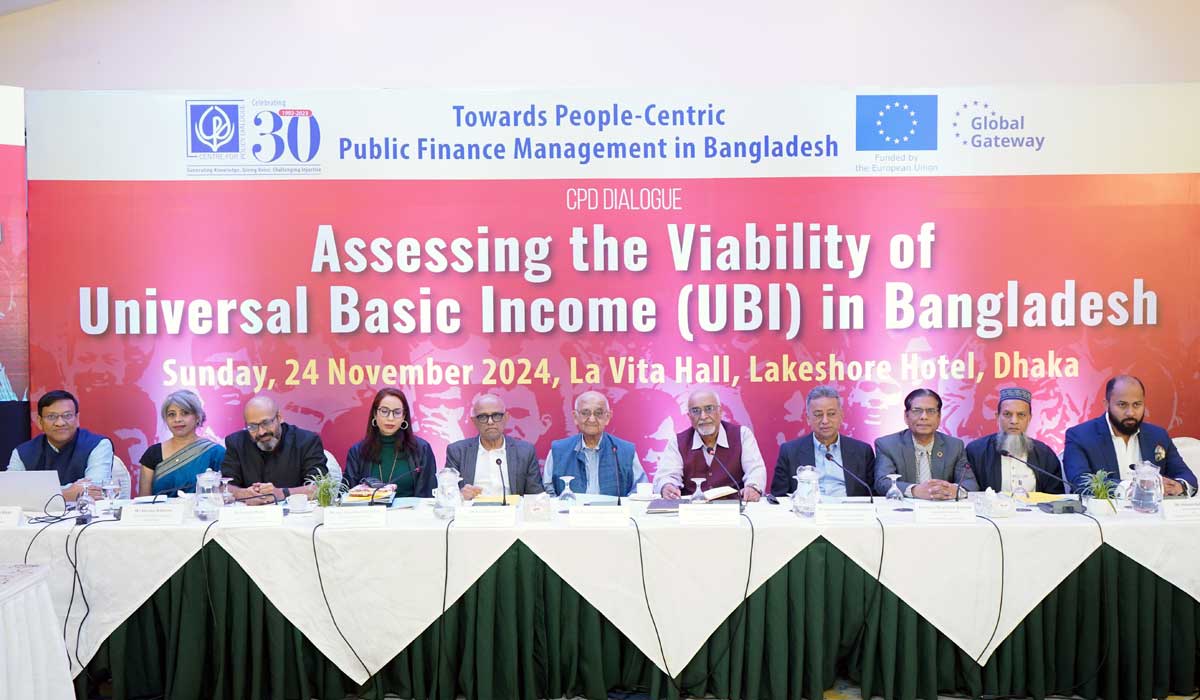
The Centre for Policy Dialogue (CPD) has suggested implementing Universal Basic Income (UBI) in Bangladesh as an effective method to alleviate poverty, enhance citizen empowerment, and improve social protection systems, despite the existing fiscal limitations.
On 24 November 2024, the findings of the study titled ‘Assessing the Viability of Universal Basic Income (UBI) in Bangladesh’ were presented at Lakeshore Hotel, Dhaka. The study examines the feasibility of implementing UBI in Bangladesh, considering the country’s current socio-economic circumstances. The dialogue was organised by CPD with support from the European Union.
UBI is a policy proposal under which all citizens within a population receive a minimum income through unconditional cash transfers. While a full-scale basic income programme is yet to be implemented anywhere in the world, several countries have experimented with partial basic income models in the past. In Bangladesh, where poverty rates remain high and socio-economic inequality is prevalent, the feasibility of addressing these issues through UBI has become a subject of significant discourse.
Dr Debapriya Bhattacharya, Distinguished Fellow at CPD, underscored the timeliness of discussing UBI as Bangladesh stands at a critical juncture in its developmental journey. He envisioned UBI as a transformative approach to guarantee every citizen a basic level of security and development opportunity.
Professor Rehman Sobhan, Chairman, CPD, emphasised that with Professor Muhammad Yunus, a globally recognised leader in the fight against poverty, now heading the Interim Government, the study on UBI goes beyond the academic deliberations and carries the potential to influence serious policy considerations. He posited that this study could serve as a foundation for prospective reform agendas under the leadership of Dr Yunus, paving the way for transformative policy actions aimed at addressing poverty and inequality.
Amir Khasru Mahmud Chowdhury, Standing Committee Member of the Bangladesh Nationalist Party and former Minister of Commerce, emphasised that achieving an egalitarian society and a welfare state in Bangladesh requires addressing past economic exploitation and the concentration of wealth that has deprived the majority.
Professor Mustafizur Rahman, Distinguished Fellow, CPD, noted that the discussion had provided clarity on key aspects such as conceptual understanding, financing, challenges, and the practical implementation of UBI. He added that, in the context of Bangladesh’s ongoing movement against inequality, the focus should be on determining how to link existing income levels with a minimum guaranteed income.
Mr Towfiqul Islam Khan, Senior Research Fellow at CPD, presented the keynote presentation and proposed a partial UBI model tailored to the country’s fiscal realities, aimed at reducing poverty and enhancing socio-economic equity. This model includes a poverty scorecard to target aid effectively, with potential scenarios varying from covering 11 high-poverty districts to expanding across 64 districts.
Mr Mostofa Kamal, Additional Secretary (Institutional Wing), Ministry of Social Welfare, Government of Bangladesh, acknowledged the potential of UBI and stressed the importance of including innovative ideas in social welfare programmes, emphasising that successful initiatives require strong project design and competent implementation.
Ms Iole Valentina LUCCHESE, Attaché – Programme Manager, Social Protection, Delegation of the European Union to Bangladesh, raised important questions regarding the administrative costs and potential political biases in targeting beneficiaries, urging careful consideration of objective criteria, like income levels, to ensure fairness. She also suggested exploring innovative funding options for UBI, such as carbon taxes, and recommended aligning social protection with labor market policies.
Concerns were expressed by Mr Rizwan Rahman, former President of the Dhaka Chamber of Commerce and Industry (DCCI) and Managing Director of ETBL Holdings Limited, about Bangladesh’s low tax-to-GDP ratio posing a significant challenge to financing UBI, compared to countries where it has been implemented. He also highlighted key hurdles such as the need for improved infrastructure and preventing fund misallocation.
Ms Aneeka Rahman, Senior Social Protection Economist, World Bank, mentioned that while UBI is an attractive global concept, its implementation in Bangladesh faces challenges related to accurately targeting beneficiaries and addressing poverty dynamics, particularly in rural and urban areas. She emphasised that while UBI is fiscally viable, the real issue lies in improving the effectiveness of current social protection systems through better identification methods and regular updates to reflect changing poverty conditions.
Dr Imran Matin, Executive Director, BRAC Institute for Governance and Development, advocated for innovative approaches to social protection in Bangladesh, noting that the current system often fails to address the complexities of poverty and lacks reliability. He stressed the need to integrate both protection and promotion in social policies.
The Chief Coordinator of Kendrio Shomonnyok Gono Shonghoti Andolon, Mr Zonayed Saki, highlighted a key challenge in Bangladesh—ensuring funds reach the people effectively without undermining government services like education and healthcare. He noted that economically, this could boost market dynamics but stressed the need for a corruption-free National Board of Revenue (NBR) to ensure proper tax collection and financing.
Dr K A S Murshid, Chair of the Taskforce on ‘Re-strategising the Economy and Mobilising Resources for Equitable and Sustainable Development’ and Former Director General of the Bangladesh Institute of Development Studies (BIDS), acknowledged the longstanding challenge of consolidating Bangladesh’s numerous social security programmes into a more unified and efficient framework could finally become achievable for smoother implementation.
Several prominent former government officials, academicians, researchers, advocates, and political and business leaders also contributed to the dialogue with their special remarks.



